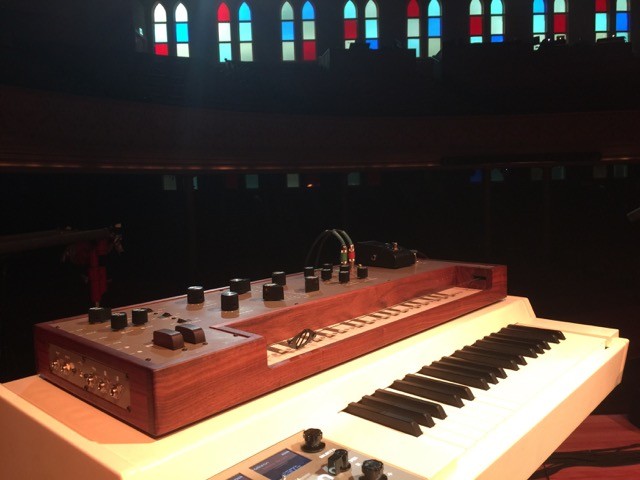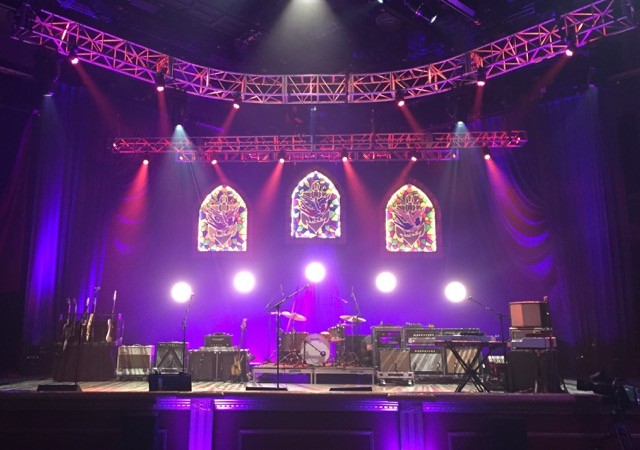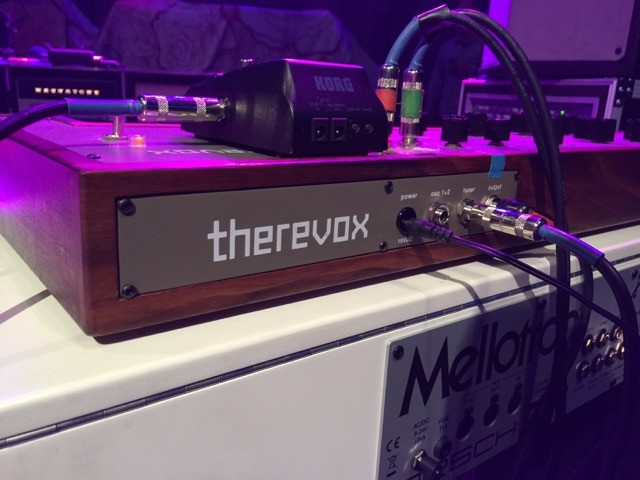Therevox Artist Profile: Derry deBorja (Jason Isbell and The 400 Unit)
December 20th, 2015 posted by mike under Artist Profiles.Derry deBorja has played in bands like Canyon and Son Volt, and now plays keyboard and a Therevox ET-4.3 with Jason Isbell and The 400 Unit.
Therevox: How long have you been playing with Jason Isbell and The 400 Unit, and how did you get started playing with those guys?
Derry deBorja: I’ve been playing with Jason for almost nine years now. We met back in 2006 during a co-headlining tour featuring our former bands, The Drive-by Truckers and Son Volt. I remember the first night of the tour, walking circles around the block of the music venue making phone calls. Jason was doing the same, but walking the opposite direction. Every time we’d pass, we’d nod at each other and continue on our way. We did that three or four times before finally putting our phones down and introducing ourselves. We became good friends during that tour. When Jason was ready to leave The Truckers and go solo, he gave me a call.
The 400 Unit’s had a few lineup changes over the years. The current lineup features Jimbo Hart on bass, Chad Gamble on drums, Sadler Vaden on guitar, and yours truly handling keys. We’re headquartered in Nashville, although half the band resides in Northern Alabama.
You guys recently did a four-night stand at The Ryman Auditorium in Nashville, how did that go?
Completing a four-night, sold out stand at The Ryman Auditorium meant a lot to us. Nashville’s served as our home base for a few years now, so it’s really inspiring to see that level of “hometown” support. I count myself very lucky knowing I’m part of something that resonates with so many people. It’s really a good feeling.

How would you describe the music scene in Nashville?
I’ve never been part of a scene that is so active and vital as Nashville’s. There are so many people involved in making music here—so much being produced or being performed at any given time. I never feel like my job is done when I come home from a run of shows. The air around Nashville is constantly reminding me that there’s always more to experience and more to accomplish right here.
Last year you guys recorded a cover of Beck’s “Now That Your Dollar Bills Have Sprouted Wings” from his Song Reader album, which was released as sheet music only. Can you explain the process of turning sheet music into a song?
Turning sheet music into song is much like taking a studio recording and bringing it to life for a live audience. It’s all about expression and impact. You can play the notes on the page, but they don’t necessarily mean anything if the performance isn’t grabbing hold of the listener.
From chord progressions to arrangement choices, the Song Reader material is laid out very traditionally. Going in to the studio, we knew we wanted our cover to break out of that mold. That took a lot of experimentation. We threw a lot of ideas up against the wall to see what would stick. Then we’d tear down that wall, build a new one, and throw even stickier ideas against that one. The process was a lot of fun and the end result was something no one in the band or even our producer expected.

What made you choose to use the Therevox on that song?
There is something inherently “rootsy” about the Song Reader material and we wanted our cover to break away from those leanings. Sonically, the Therevox fit the bill with that in mind. I mean, it’s not an instrument you typically see at Americana festivals.
What other songs do you use Therevox on, and what sort of parts do you use it for?
I never intended to use the Therevox live on stage. I used to set it up before soundchecks just to have something to fool around with as the stage was being set. But after a week or two, we started leaving it set up during our performances. Parts for songs would develop from there—from short melodic lines that hint at lap steel to gigantic, otherworldly atmospheres. The Therevox is such a versatile instrument in that regard.
There are Therevox parts scattered throughout our live set. “Never Gonna Change” (a song Jason wrote during his tenure with The Drive-by Truckers) features an atmospheric line that takes advantage of the Therevox’s beautiful built-in spring reverb. The intro to “Super 8” (from 2013’s Southeastern) features a low-end rumble that can shake a music venue down to its foundation. Perhaps my favorite use of the Therevox is in “Songs She Sang In The Shower” (also from Southeastern). The hold knobs on my ET-4.3 allow me to create a drone during the second verse while my hands are busy playing other keyboard parts.
What other instruments do you play with this band?
I’ve always got a bunch of keyboards in front of me during Jason Isbell And The 400 Unit shows. My current setup features the Therevox ET-4.3, a Nord Electro 5D, a Mellotron M4000D, a Mellotron M4000D Mini, a Hohner Anacleto accordion, and an Electron Octatrak.
Do you use any effects with the Therevox?
I do. I’m running a Moog Minifooger Boost and an Earthquaker Devices Disaster Transport delay through my ET-4.3’s effects loop. They sound great through the Therevox’s built-in spring reverb. The Moog Boost pedal has a ladder filter built into it that gives me extra tonal control when used in conjunction with the Therevox’s own LP filter.

You play on Jason’s fifth studio album, “Something More Than Free”, where did you guys record and what was the process like?
We recorded the majority of “Something More Than Free” at The Sound Emporium here in Nashville under the watchful eyes and ears of Dave Cobb, our producer. Additional recording, overdubs, and mix were handled at Cobb’s own studio, Low Country Sound.
The entire process was short, quick, and easy. We’d averaged about 1 1/2 songs a day over a couple weeks. I barely remember, it happened so fast! I believe it stands as a testament to the talents of Jason as a songwriter, the talents of our producer, and the talents of a band that has played so many shows together over the past nine+ years. We’re really a family at this point. We have a novel’s worth of in-jokes no one outside could possibly understand.
What do you do when you aren’t playing music?
I fell down the modular synthesizer rabbit hole a little over a year ago. A lot of my free time has been devoted to building one and studying it’s potential and uses. It’s a very deep rabbit hole.
The rest of my free time I spend avoiding butterflies and cold weather.
Previous Therevox Artist Profiles
Simen Skari of Norway’s “Team Me”
Video and Interview with Therevox player Mark Calcott
Producer/Dub Musician Mario Siperman Interview
Martin Schiller – Sampling/Looping Video and Interview


